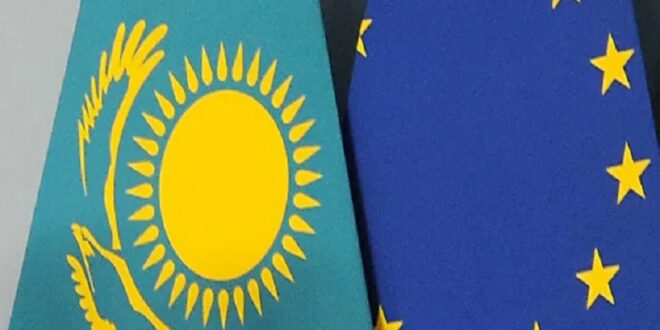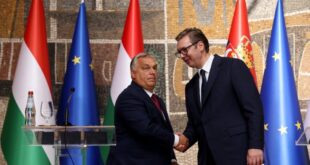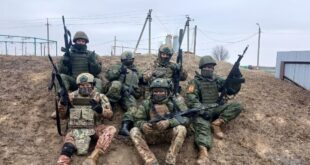The Sino-Russo Entente dislikes Tokayev’s reliance on the EU as the means for averting Kazakhstan’s potentially disproportionate dependence on them. His pledge to uphold the West’s anti-Russian sanctions was obviously done under pressure, which proves that his attempts to preserve strategic autonomy in this manner have failed. Neither Russia’s nor China’s ties with Kazakhstan are expected to enter into crisis, but they’ll likely remain influenced by the EU from now on.
The writing was on the wall earlier this summer that Kazakh President Tokayev would inevitably come out in support of the West’s anti-Russian sanctions, which he just did last week after publicly pledging to uphold them during his trip to Germany. Before diving into the various dimensions of what this means, the reader should familiarize themselves with the following background analyses that’ll help them better understand how everything got to this point:
- 21 June: “Kazakhstan’s Decision To Stop Hosting Talks On Syria Is Another Concession To The West”
- 25 July: “Russia’s Southern Transport Corridor To Central Asia Safeguards Against Kazakh Treachery”
- 4 August: “Turkmenistan Is Indispensable To Uzbekistan & Tajikistan’s Future”
In brief, Tokayev’s pro-Western pivot began shortly after a Russian-led CSTO operation saved his government from an attempted terrorist coup in January 2022. It was designed to preemptively avert potentially disproportionate dependence on the Kremlin in the aftermath, but the ultimate result is that it gradually turned him against his benefactor at the West’s behest. Moscow foresaw this, however, which is why it was ready to diversify regional trade corridors by this summer once ties worsened.
Both sides still officially claim that everything is hunky-dory in their relationship, but their respective rhetoric rings hollow since Russia wouldn’t have pioneered the Kazakh-evading Southern Transport Corridor (STC) with its other Central Asian partners if the Kremlin truly believed this. Likewise, Tokayev wouldn’t have pledged to uphold the West’s sanctions against his country’s nominal Eurasian Economic Union (EAEU) partner if he didn’t want to curry favor with that New Cold War bloc at Russia’s expense.
Nevertheless, just like it’s dishonest to deny the latest trouble in their ties, it’s also insincere to exaggerate their problems too. TASS reported last week that bilateral trade exceeded $15.6 billion between January-July and that the two sides are implementing 40 projects worth $16.6 billion. These statistics prove the resilience of their economic-financial ties due to the complex interdependence that they achieved over the past three decades.
The abovementioned observation adds credence to the prediction that no full-scale “decoupling” between Russia and Kazakhstan will take place no matter how much the West wants that to happen for regional divide-and-rule purposes. At the same time, they’ll likely continue growing apart in various respects, but in a way that’s manageable for the most part and prevents any mutually disadvantageous crisis from breaking out.
Bilateral trade will therefore probably remain stable and could even grow, but in parallel with each becoming crucial states along perpendicular Eurasian integration corridors. Tokayev said in Germany that he envisages Kazakhstan turning into a “key transit hub” along the Sino-Turkish Middle Corridor (MC) through Central Asia, the Caspian Sea, and the South Caucasus, which also connects to the EU via the Black Sea. He also added that his country can become the EU’s reliable natural resource partner.
As for Russia, President Putin’s speech at the Eastern Economic Forum in early September confirmed that his country is simultaneously prioritizing the Northern Sea Route (NSR), Siberian rail modernization in order to scale connectivity with China, and the North-South Transport Corridor (NSTC) to India. These megaprojects are complemented by the comparatively minor one of the STC that was pioneered over the summer for keeping trade with Central Asia stable on the off chance that Kazakhstan cuts off access.
Out of Russia’s four connectivity priorities, the NSR is the only one that’s relevant to the West, albeit indirectly since it just involves Russia facilitating Asian-EU trade via the Arctic. By contrast, the MC is seen by Tokayev as primarily expanding his country’s trade and investment ties with the EU as evidenced by his latest statements. This conceptualization is thought to help Kazakhstan preemptively avert potentially disproportionate dependence on China and Turkiye.
That’s not to say that Kazakhstan doesn’t expect to profit off of bilateral trade with those two or from facilitating the EU’s and Turkiye’s with China, but just that it doesn’t want to place itself in a position where it risks becoming too dependent on any given partner. The precedent established by relying too much on the EU to avert this vis-à-vis Russia after the January 2022 incident suggests that the bloc will similarly seek to exploit this role in Kazakh strategy vis-à-vis China and Turkiye to divide them all too.
Just like Moscow foresaw this, so too can it be argued that Beijing has as well, which one can see from the recent progress that it’s made on long-held plans to build a China-Kyrgyzstan-Uzbekistan railway. China already has rail access to Uzbekistan via Kazakhstan, but it doesn’t want to remain dependent on that country for facilitating their bilateral trade since there’s a risk that it could uphold the West’s anti-Chinese sanctions in the event that ties deteriorate just like it’s upholding their anti-Russian ones.
The China-Kyrgyzstan-Uzbekistan railway therefore serves the same function as Russia’s STC does with respect to enabling both to continue trading with Central Asia (and with Turkiye in China’s case) on the off chance that Kazakhstan cuts off their access to the region under Western pressure. This shows that China doesn’t truly trust Kazakhstan either otherwise it wouldn’t invest so heavily in such an expensive infrastructure project through mountainous terrain just to shave off a day or two in transit to Tashkent.
The takeaway is that the Sino-Russo Entente dislikes Tokayev’s reliance on the EU as the means for averting Kazakhstan’s potentially disproportionate dependence on them. His pledge to uphold the West’s anti-Russian sanctions was obviously done under pressure, which proves that his attempts to preserve strategic autonomy in this manner have failed. Neither Russia’s nor China’s ties with Kazakhstan are expected to enter into crisis, but they’ll likely remain influenced by the EU from now on.
 Eurasia Press & News
Eurasia Press & News



